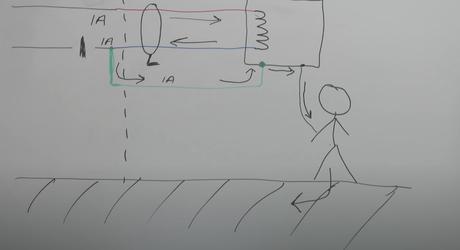- Nov 29, 2021
- 3
- 1
- 33
- If you're a qualified, trainee, or retired electrician - Which country is it that your work will be / is / was aimed at?
- United Kingdom
- What type of forum member are you?
- Trainee Electrician
Sorry if these questions are dumb, but I thought I'd ask you guys as I'm brand new to this field. I was watching this video from John Ward and had a few questions about it.
1. In a TN-C-S system, if there was a PEN fault before the service head, the current would go through the protective devices as normal and wouldn't detect an imbalance. But when it returns through the neutral and reaches the break in the PEN, it has to come back on itself. So would the current return through both the earth and the neutral conductor at all or would it return entirely through the earth (presumably because the earth conductors are designed to be a faster route to true earth, and because there is more potential difference in the earth path than the neutral path back to the appliance/live conductor)?
2. Also what is the point in using TN-C-S system other than it being cheaper because you have one less conductor to have separately running through the street? Is this worth the safety concern it comes with?
3. What is the best solution to this problem? TT systems with plastic incoming pipes?
Many thanks
1. In a TN-C-S system, if there was a PEN fault before the service head, the current would go through the protective devices as normal and wouldn't detect an imbalance. But when it returns through the neutral and reaches the break in the PEN, it has to come back on itself. So would the current return through both the earth and the neutral conductor at all or would it return entirely through the earth (presumably because the earth conductors are designed to be a faster route to true earth, and because there is more potential difference in the earth path than the neutral path back to the appliance/live conductor)?
2. Also what is the point in using TN-C-S system other than it being cheaper because you have one less conductor to have separately running through the street? Is this worth the safety concern it comes with?
3. What is the best solution to this problem? TT systems with plastic incoming pipes?
Many thanks









